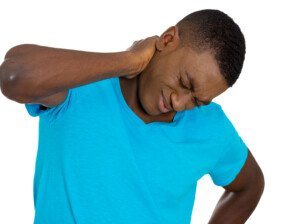Heart problems can cause neck pain.
But so many benign conditions can cause neck pain as well, such as TMJ disorder and a pinched nerve.
So how can you tell that the pain in your neck just might be coming from a serious heart problem?
After all, the neck is a common area for soreness, aching and more severe types of discomfort.
How to Tell Your Neck Pain Might Be Caused by a Heart Problem
A good tipoff is the presence of certain additional symptoms.
“While many different disorders can cause anterior [front] neck pain, neck pain associated with difficulty breathing, chest pain, feeling flushed or sweating, or palpitations should raise suspicion for acute cardiac pathology,” explains Sendhil Krishnan, MD, a board-certified adult general cardiologist with advanced subspecialty training in interventional cardiology.
Dr. Krishnan adds, “The reason for the association of neck and jaw pain with cardiac problems has to do with cranial nerve X (10), also known as the vagus nerve.”
Four Functions of the Vagus Nerve
• Sensory: from the throat, heart, lungs and abdomen
• Special sensory: provides taste sensation behind the tongue.
• Motor: Provides movement functions for the muscles in the neck responsible for swallowing and speech.
• Parasympathetic: Responsible for the digestive tract, respiration and heart rate functioning.
An easy way to answer why a heart problem can cause neck pain or aching is that the brain sometimes can’t figure out how to interpret pain signals when nerves are located so close to each other.
This is why a heart attack can also cause pain down an arm.
Signs Your Neck Discomfort Is Probably not Related to Your Heart
• The pain occurs only when you move your neck or in certain positions such as looking way up or turning your head only to the left.
• It occurs only after a certain weightlifting exercise such as an overhead barbell press.
• It’s clearly associated with sleep position or with a particular pillow.
• The area of discomfort is sore or tender to the touch.
• It’s accompanied by tingling or a numb sensation going down the arm (suggestive of nerve compression in the neck).
Ongoing neck pain without an explanation or that does not respond to modifications, such as a more comfortable pillow or ceasing a suspected offending exercise, needs a medical evaluation – even if there are no other symptoms with it.
 Dr. Krishnan is with Pacific Heart & Vascular, where you can view his videos on heart disease and healthy living. He has numerous publications and often speaks at local and regional events.
Dr. Krishnan is with Pacific Heart & Vascular, where you can view his videos on heart disease and healthy living. He has numerous publications and often speaks at local and regional events.
 Lorra Garrick has been covering medical, fitness and cybersecurity topics for many years, having written thousands of articles for print magazines and websites, including as a ghostwriter. She’s also a former ACE-certified personal trainer.
Lorra Garrick has been covering medical, fitness and cybersecurity topics for many years, having written thousands of articles for print magazines and websites, including as a ghostwriter. She’s also a former ACE-certified personal trainer.
.



























